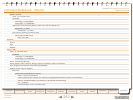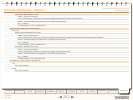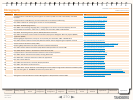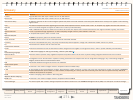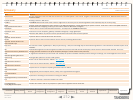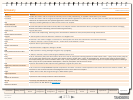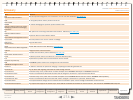
273
D14049.04
JULY 2008
Grey Headline (continued)
TANDBERG VIDEO COMMUNICATIONS SERVER
ADMINISTRATOR GUIDE
Introduction Getting Started
Overview and
Status
System
Conguration
VCS
Conguration
Zones and
Neighbors
Call
Processing
Bandwidth
Control
Firewall
Traversal
Appendices
Applications Maintenance
Glossary
Term Denition
Local VCS A relative term used to refer to the particular VCS that you are currently administering, as opposed to other VCSs in your network.
Local Zone A relative term used to refer to the group of endpoints and other systems registered to a particular VCS. If a VCS is part of a cluster, the Local Zone refers to the
collection of all endpoints and other systems registered to all Peers in that cluster.
LRQ
Location Request
A RAS query between gatekeepers to determine the location of an endpoint.
Microsoft OCS 2007 Microsoft OCS (Ofce Communications Server) 2007 is an enterprise real-time communications server, providing the infrastructure to allow instant messaging,
presence, audio-video conferencing and web conferencing functionality.
NAPTR record A type of DNS record.
NAT
Network Address Translation
Also known as IP masquerading. Rewriting source and destination addresses as the IP packet passes through the NAT device.
Neighbor An remote system to which the VCS has a connection via a Neighbor Zone.
Neighbor zone On the VCS, a zone used to congure a connection to a remote system with which the Local VCS has a non-traversal relationship.
Node In relation to the VCS, a node is one end of a link. A node can be a local subzone or a zone.
NTP
Network Time Protocol
A protocol used for synchronizing clocks.
Peer A VCS that has been congured to belong to a Cluster.
PEM
Privacy-Enhanced Electronic Mail:
An IETF proposal for securing messages using public key cryptography.
Pipe In relation to the VCS, a means of controlling the bandwidth used on a link.
Proxy,
Proxy Server
In SIP, an intermediary entity that acts as both a server and a client for the purpose of making requests on behalf of other clients. A proxy server primarily plays the
role of routing, which means its job is to ensure that a request is sent to another entity “closer” to the targeted user. Proxies are also useful for enforcing policy
(for example, making sure a user is allowed to make a call). A proxy interprets, and, if necessary, rewrites specic parts of a request message before forwarding it.
While a proxy can set up calls between SIP endpoints, it does not participate in the call once it is set up.
RAS
Registration, Admission and Status
A protocol used between H.323 endpoints and a gatekeeper to register and place calls.
Registrar In SIP, a server that accepts REGISTER requests and places the information it receives in those requests into the location service for the domain it handles. This
information is used to advise other SIP Proxies/Registrars where to send calls for that endpoint.
Regex
Regular Expression
A pattern used to match text strings according to a POSIX-dened syntax.
RFC
Request for Comments
A process and result used by the IETF for Internet standards.
RS-232 A commonly used standard for computer serial ports.
RTCP
RTP Control Protocol
A control protocol for RTP. Dened by RFC 3550 [17].




